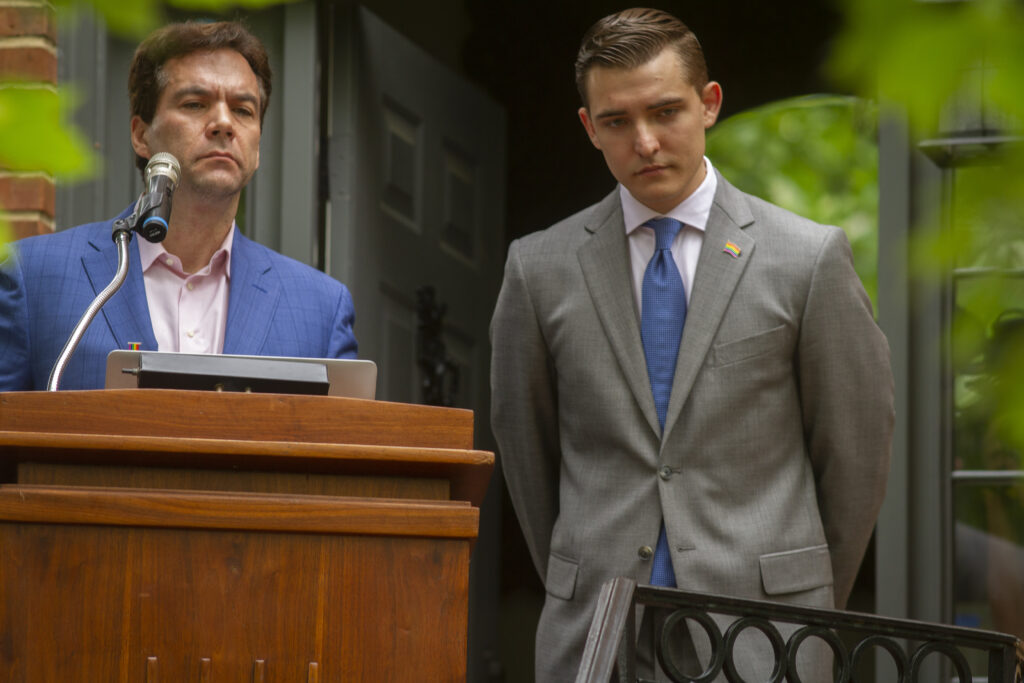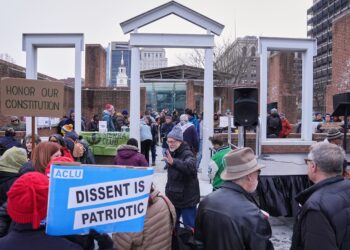In April, Alina Habba, the U.S. attorney for New Jersey, extolled her office’s role in the sentencing of a former nursing home magnate to three years in prison for defrauding the government of $38 million. The man, Joseph Schwartz, was alleged to have overseen a “collapsed nursing home empire” and “willfully” failed to pay employment taxes, Habba’s announcement said.
Around that time, Schwartz paid $960,000 to two lobbyists “seeking a federal pardon,” according to their lobbying filing.
While many people have sought pardons from President Donald Trump, few could afford to spend such a sum to seek their freedom. The disclosure provides a rare look at how federal convicts are maneuvering to gain clemency during Trump’s second term and at some of the people offering to help them.
The lobbyists, right-wing provocateurs Jack Burkman and Jacob Wohl, noted on the disclosure form that they had been convicted of telecommunications fraud in Ohio in connection with a robocall scheme designed to deter the turnout of minority voters. They also face sentencing next month in Michigan on a similar robocall case and have been subject to millions of dollars in fines in a related case brought by the Federal Communications Commission, according to state and federal authorities. For years, the pair have injected themselves into politics, such as alleging without evidence in 2018 that there were sexual assault claims against special counsel Robert S. Mueller III.
It is not clear what Burkman and Wohl did for Schwartz. But on Nov. 14, seven months after Habba celebrated Schwartz’s conviction, Trump granted Schwartz a “full and unconditional” pardon.
Liz Oyer, a former U.S. pardon attorney who was fired by Trump in March, said the involvement of the lobbyists — and the huge payment — heightens concern that there is “a special tier of justice for people who can afford to pay.”
She said the Schwartz case is notable because the pardon went against a March recommendation by Trump’s Justice Department, which cited the seriousness of Schwartz’s crime in seeking a sentence of a year and a day. The judge rejected that recommendation and in April imposed a three-year sentence. Schwartz had served three months when he was pardoned, according to his attorney.
Burkman, whose company JM Burkman & Associates is listed as receiving the payment, declined to discuss his role in the case. In a brief telephone interview, he said, “We are just so proud and delighted that the president pardoned him. Other than that, I can’t talk about clients, I’m sure you understand.” In a follow-up email, he called Schwartz “a wonderful human being and man of God who had been unfairly accused by the Biden DOJ.”
Wohl, who declined to answer specific questions, said via email, “We are extremely grateful for President Trump’s bold action to clear the name of Rabbi Schwartz.”
A White House official, asked whether Trump or others in the White House or Justice Department had met with either of the lobbyists, responded in a statement: “No one from White House Counsel nor [White House pardon czar] Alice Johnson met with the individuals named. Either way, the President is the final decision-maker on all pardons, and any one spending money to lobby for pardons is foolishly wasting funds.” The Justice Department, which has an office that handles pardon requests, referred questions to the White House.
The White House defended the rationale for the pardon in a separate statement. It said Schwartz relied on a third party for the payments at issue. “Mr. Schwartz failed to properly oversee that some funding was used for company operations instead of taxes. No funds were used for personal enrichment and Mr. Schwartz immediately paid $5 million dollars in restitution. Prosecutors initially recommended probation, but the Judge insisted on a sentence of three years — a sentence that is exceptionally harmful to a 65-year-old man already in deteriorating health.”
The statement did not address the fact that it was a prosecutor from Habba’s office who at an April hearing recommended a sentence of a year and a day, or at least something in a range of six to 18 months, according to a court transcript.
The White House also pointed to a comment from press secretary Karoline Leavitt, who said in a recent briefing that Trump was most interested in pardoning those who were “abused and used by the Biden Department of Justice.”
Schwartz declined a request for comment. Kevin Marino — who was Schwartz’s defense lawyer in the criminal case but said he was not directly involved in the pardon process — said Trump’s action was justified because Schwartz was trying to save his business and not trying to enrich himself. He also noted that the judge imposed a sentence that was much longer than recommended by the government.
“He got upside down in this nursing home business,” Marino said. “He had had a very successful insurance brokerage, and after selling that, he got involved in the nursing home business, and it was pretty much a perfect storm that the business failed massively.”
Schwartz and his company made national news in 2019, when NBC News reported that Schwartz’s company, Skyline Healthcare, was in serious trouble. It said more than a dozen of its nearly 100 nursing homes had closed, “throwing residents, vendors, employees and state regulators into chaos.” The report, which said the company was run from a small office above a New Jersey pizzeria, called it the story of how “one man built an empire that quickly crumbled, with painful consequences for vulnerable people.”
A subsequent report by McKnight’s Long-Term Care News said the failure of the company affected 7,000 nursing home residents and 15,000 employees, and led some states to change the way such facilities are regulated.
Schwartz has also faced charges in state court. He pleaded guilty this year to committing Medicaid fraud and attempted tax evasion in Arkansas, where he was ordered to pay $1.8 million in restitution.
Schwartz was indicted in 2022, during the Biden administration, for allegedly using $38 million in payroll taxes “for his own personal gain and for other expenses of the Staffing Companies,” according to a court filing. After Schwartz pleaded guilty in November 2024, the case was picked up during the Trump administration by the office run by Habba, who previously worked on Trump’s personal legal team. Habba’s office did not respond to a request for comment.
During the April 10 sentencing hearing, Schwartz apologized “to the Court, to the Government, my family, my community for all the hurt my actions have caused. I always tried to live the right way, set the good example. I did not do that here. I am very sorry for that.”
Marino, representing Schwartz in court, told the judge that his client had “scraped together” the required $5 million to the government under a restitution agreement.
U.S. District Judge Susan D. Wigenton also fined Schwartz $100,000 and imposed the three-year sentence, citing sentencing guidelines, the seriousness of the offense and “a need for deterrence” against similar crimes by others.
JM Burkman & Associates disclosed the $960,000 lobbying fee in a July 18 filing that covered the period between April 1 and June 30. The filing was first reported by the NOTUS news website.
Marino said that after learning about the pardon on Nov. 14, he drove two hours to a federal prison in Otisville, New York, picked up Schwartz and brought him home to celebrate with family and friends.
Oyer, the former U.S. pardon attorney, called the decision to grant a pardon in the Schwartz case “very unusual.” She noted that Justice Department guidelines recommend that an individual not be considered for a pardon “until they’re five years out from having completed their prison sentence” and have demonstrated exemplary rehabilitation after they return to their community.
The guidelines — which are not binding on the president — also say that a waiver can be granted if a petitioner meets certain conditions, such as accepting responsibility and making restitution.
“To the extent [Oyer] is suggesting the presidential pardon power is anything other than absolute, I quite disagree with her,” Marino said.
The lobbying disclosure form says Burkman and Wohl contacted Congress, the White House and the Justice Department on Schwartz’s behalf but does not provide further details.
The form does require disclosure of federal or state convictions, and the pair gave identical responses about being convicted of “Illegal campaign robo calls, telecommunications fraud” in Ohio during the 2020 election. In that case, Ohio Attorney General Dave Yost accused the pair of seeking to suppress voter turnout in minority neighborhoods, calling it attempted “voter intimidation.” They were sentenced to probation and 500 hours of community service, according to sentencing documents.
In 2023, the Federal Communications Commission announced that it had levied a $5.1 million fine against Burkman and Wohl for robocalls that told some potential voters that if they voted by mail, their personal information would be available to debt collectors. The FCC, Burkman and Wohl did not respond to questions about whether the fine had been paid.
In 2024, New York Attorney General Letitia James announced fines against Wohl and Burkman, whom she called “two conspiracy theorists who launched a robocall campaign designed to prevent Black New Yorkers from voting by mail ahead of the 2020 election.”
Separately, the pair pleaded no contest in August to charges of suppressing Black voters in Detroit in 2020. In that matter, Michigan Attorney General Dana Nessel said in a press release that the pair claimed to be founders of a civil rights organization and urged predominantly Black voters not to be “finessed into giving your private information to the man. Stay safe and beware of vote by mail.” Nessel called it “an egregious example of voter suppression.” Sentencing is scheduled for Dec. 1.
Wohl and Burkman were also in the news in 2020 for orchestrating a fake raid in which actors were hired to impersonate FBI agents. After the raid was pitched to The Washington Post as real, the newspaper briefly posted a story about the event before it was corrected to say that the information was false.
In a story headlined, “A fake FBI raid orchestrated by right-wing activists dupe The Washington Post,” Burkman was quoted as saying: “You have to remember in journalism you have to be careful — I’m not saying you did this — creating your own reality and ensnaring yourself in those realities.”
Marino said that he did not know about the lobbyists until contacted by a reporter from The Post, and that he did not speak to anyone in Trump administration regarding the pardon. As for Schwartz’s decision to hire the lobbyists, he said, “Rabbi Schwartz just wanted the world to know the real Joe Schwartz.”
As for his own role, Marino said that he and other lawyers helped provide information for an appeal of Schwartz’s sentence, which he said contained facts relevant to the pardon process.
Marino said it is still “an open question” whether Schwartz will recover the $5 million in restitution and the $100,000 fine.
Burkman and Wohl are registered to lobby for a pardon in another case.
In October, Burkman and Wohl registered to lobby for Torence Hatch, a rapper widely known as “Boosie Badazz,” and wrote that they planned to lobby on “seeking a presidential pardon.” The filing was first reported by Legistorm. In August, Hatch pleaded guilty to possessing a gun as a felon. He is scheduled to be sentenced by a federal judge in January. Hatch previously wrote on X that “I WAS TARGETED” and called for Trump to review his case.
Hatch’s lawyer, Meghan Blanco, declined to comment.
Beth Reinhard contributed to this report.
The post The case of a felon who paid lobbyists nearly $1 million to seek a Trump pardon appeared first on Washington Post.




